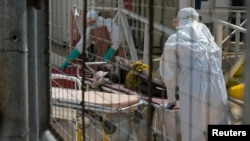By far the biggest global health challenge facing the chief of the International Federation of Red Cross and Red Crescent Societies (IFRC) is Ebola.
In fact, when Elhadj As Sy took over as secretary general of the IFRC last August, West Africa had already been struggling with an out of control Ebola outbreak since the beginning of the year.
VOA Somali service reporter Harun Maruf spoke with IFRC chief about his agency's work to stem the epidemic.
EAS: "We all hope so but I have learned right from the beginning of this epidemic starting to make prognosis of categorical eradication in a number of weeks and days is not very responsible honesty.
"I think the trend is a good one. We are seeing signs in Liberia where we believe if the efforts are sustained at this level and there is no new cases coming forward and the communities are cooperating the way they are doing right now, it is possible to contain this epidemic."
VOA: Are you worried people may relax and stop taking protective measures against the virus now that the infection rate is slowing?
EAS: "I have that concern for two reasons. One is complacency to start already declaring it’s over. It’s not over until it’s really completely over, so no room for complacency.
"Two: I still feel stigma and discrimination attached to Ebola is still extremely high and that is one of the risks of driving people underground and not go for health seeking behavior and that can lead to the fact that the interest this epidemic and has been gaining in the media and in the other forum may decline, so the combination can be really deadly.
"It’s time to build on the achievements that have been made, to celebrate the success that we have achieved, but those should be more motivating factors for us to continue doing the work and be prepared even for the aftermath of Ebola."
VOA: What about new cases being reported in West Africa?
EAS: "[There are] new cases mainly in some regions in Sierra Leone because we identified very clearly which were those areas [and] which were most affected, particularly in a region around Kanama and Kailahun where the treatment centers were built.
"In Guinea, it was in the area of Macenta that was the epicenter of the epidemic that we started seeing some remote villages in the same countries that we are starting to see some cases, they are not big in scale.
"But as I said every single one case is a source to worry, and we have been expanding very rapidly together with all partners in response to those areas as well, because what it means at the end is it’s not enough to only concentrate in the areas that are currently affected, but in each of those three countries in every community to make sure that preventive measures are taken."
VOA: What has been the turning point in the fight against Ebola?
EAS: "The turning point has been community mobilization and cooperation. Health seeking behavior is a personal individual decision. The attitudes that happen at community level is very critical to either promote that or to inhabit it. The communities when they started cooperating in identifying the sick people that was a very good first step.
"When they started accepting that they can’t mourn their dead in the way they used to, they cannot wash their dead bodies the way they used to and they trusted us in particular the red cross and red crescent movement to take care of the safe and dignified burial that was an excellent other move in that direction. When they started creating the enabling environment to reduce stigma and discrimination related to it, this is a very important building block."
VOA: Is there a vaccine that is ready?
EAS: "No, there is no vaccine which is ready to stop the epidemic. People are working very hard to develop one, they are working very hard to go through the different test and the phased trail of a vaccine, so there is a hope. But this is not a time to transfer all our hope into a vaccine, but to continue focusing also on the pillars of the response so far while continuing the research and investment for a vaccine."
VOA: Tragically, more than eight thousand have died and many are still. What are the long term effects of this outbreak?
EAS: "The long term effects first of all are the health systems that need to be strengthened and they have been weakened. The first victims of the Ebola were the health workers. Sierra Leone lost its finest doctors. One of the best specialists in the neurological microbiology died by trying to save the lives of others. So there will be need to train and retain and motivate the health personnel and put them in conditions where they can be protected so I think that is one of the longer term effort."





